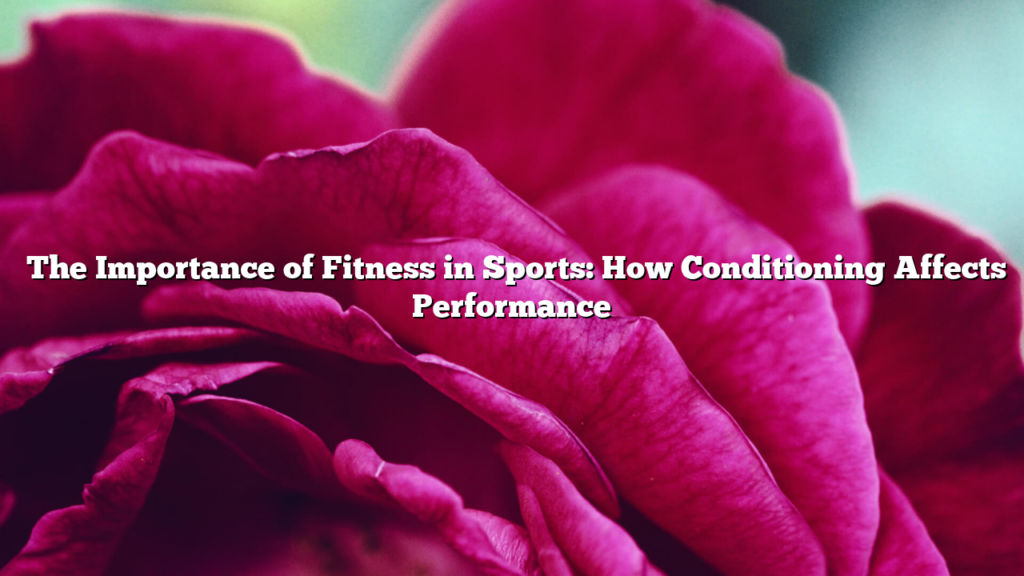
The Importance of Fitness in Sports: How Conditioning Affects Performance
Introduction
In modern sports, fitness is just as crucial as skill and strategy. Whether it’s football, basketball, athletics, or even golf, athletes must be in peak physical condition to perform at their best. A well-conditioned athlete has greater endurance, strength, agility, and flexibility, which can make the difference between winning and losing.
Fitness in sports is not just about running fast or lifting heavy weights; it involves a combination of strength, endurance, flexibility, balance, and recovery. In this article, we will explore the different components of fitness in sports, why they are important, and how athletes train to improve their performance.
1. The Key Components of Fitness in Sports
1.1 Endurance: Stamina for Sustained Performance
Endurance is the ability to sustain prolonged physical activity without excessive fatigue. It is essential in sports such as football, marathon running, cycling, and swimming.
● Types of Endurance:
○ Aerobic Endurance: The ability to perform moderate-intensity activity for a long time (e.g., long-distance running).
○ Anaerobic Endurance: The ability to sustain high-intensity bursts of activity (e.g., sprinting or basketball fast breaks).
● How to Improve Endurance:
○ Cardiovascular exercises like running, cycling, and swimming.
○ High-intensity interval training (HIIT) to improve stamina.
1.2 Strength: Power for Maximum Performance
Strength is vital for almost every sport, from lifting weights in powerlifting to explosive movements in football and tennis. Strength training helps athletes improve their power, stability, and injury prevention.
● How to Build Strength:
○ Weight training with exercises like squats, deadlifts, and bench presses.
○ Bodyweight exercises such as push-ups, pull-ups, and lunges.
○ Resistance training using resistance bands or machines.
1.3 Speed and Agility: Quick Reactions for Competitive Edge
Speed is crucial in sports like track and field, football, and basketball, while agility helps in sports that require quick changes in direction, such as tennis and boxing.
● How to Improve Speed and Agility:
○ Sprint drills and ladder drills to enhance footwork.
○ Plyometric exercises like box jumps and agility cones.
○ Explosive strength training to develop fast-twitch muscle fibers.
1.4 Flexibility and Mobility: Reducing Injuries and Enhancing Movement
Flexibility allows for a greater range of motion, reducing the risk of injuries and improving overall athletic performance. It is crucial in gymnastics, martial arts, and dance-based sports.
● How to Improve Flexibility and Mobility:
○ Regular stretching exercises, including dynamic and static stretching.
○ Yoga and Pilates to enhance muscle elasticity and core strength.
○ Mobility drills that focus on joint movement and stability.
1.5 Balance and Coordination: Precision in Movement
Good balance and coordination help athletes maintain control over their movements. Sports like gymnastics, skateboarding, and surfing heavily rely on balance, while coordination is critical in tennis and boxing.
● How to Improve Balance and Coordination:
○ Balance training using stability balls and BOSU balls.
○ Hand-eye coordination drills, such as juggling or reaction drills.
○ Core exercises like planks and Russian twists to strengthen stability muscles.
2. The Role of Nutrition in Sports Fitness
A well-balanced diet is essential for athletic performance. Athletes require the right fuel to maintain energy levels, recover from workouts, and build muscle.
2.1 Macronutrients for Athletes
● Carbohydrates: The primary energy source for endurance and high-intensity activities (found in rice, pasta, fruits, and whole grains).
● Proteins: Essential for muscle repair and growth (found in lean meats, eggs, fish, and legumes).
● Fats: Provides long-lasting energy for endurance sports (found in nuts, seeds, avocados, and olive oil).
2.2 Hydration: The Key to Optimal Performance
● Dehydration leads to muscle cramps, fatigue, and decreased focus.
● Athletes should drink enough water and replenish lost electrolytes through sports drinks or natural sources like coconut water.
2.3 Supplements in Sports Nutrition
Some athletes use supplements to enhance performance, such as:
● Protein powders for muscle recovery.
● Creatine for strength and power.
● Electrolyte supplements for hydration.
3. Recovery and Rest: The Hidden Key to Fitness
Many athletes underestimate the importance of recovery in sports. Without proper rest, the body cannot repair itself, leading to fatigue and a higher risk of injuries.
3.1 The Importance of Sleep
● Sleep helps in muscle repair, hormone regulation, and mental recovery.
● Athletes should aim for 7-9 hours of sleep per night to optimize recovery.
3.2 Active Recovery and Rehabilitation
● Light exercises such as stretching, yoga, or swimming help the body recover without strain.
● Massages, ice baths, and foam rolling aid in muscle recovery and injury prevention.
3.3 Injury Prevention and Rehabilitation
● Strengthening weak muscles helps prevent injuries.
● Proper warm-ups and cool-downs before and after exercise reduce injury risk.
● Sports physiotherapy helps athletes recover from injuries effectively.
4. How Different Sports Prioritize Fitness
Different sports emphasize different aspects of fitness:
● Football (Soccer): Requires endurance, agility, and strength.
● Basketball: Demands speed, coordination, and explosive power.
toto slot : Needs agility, endurance, and hand-eye coordination.
● Swimming: Focuses on aerobic endurance and upper-body strength.
● Weightlifting: Requires pure strength and muscle power.
5. Mental Fitness: The Psychological Side of Sports Performance
Physical fitness alone is not enough—mental strength plays a huge role in an athlete’s success.
● Focus and Concentration: Athletes must stay mentally sharp during competitions.
● Motivation and Discipline: Consistent training and proper goal setting are crucial.
● Stress and Anxiety Management: Techniques like visualization and mindfulness improve mental resilience.
Conclusion
Fitness in sports is a combination of endurance, strength, speed, flexibility, balance, and recovery. No matter the sport, proper conditioning is essential for peak performance. Along with physical training, nutrition, hydration, rest, and mental fitness all contribute to an athlete’s success.
Whether you are an elite athlete or just a sports enthusiast, focusing on overall fitness can enhance your performance, prevent injuries, and improve your overall health.



